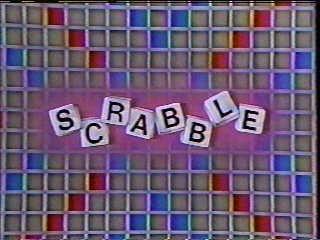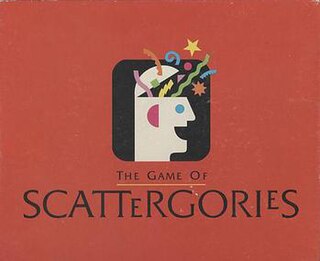Description
The original game set includes four plastic display racks and four decks of 96 cards. Each card has either one letter or a blank on it. Each deck has 5 each of A, S, blank; 3 each of B, H, P, W, Y; 2 each of J, Q, V, X, Z; and 4 each of all the other letters. Each display rack can hold up to twelve cards, with a point value assigned to each card position: 5-10-15-15-10-5-5-10-15-15-10-5. The cards are used to spell out each player's secret word face-down on one of the racks. For words less than 12 letters, blank cards may be used at one or both ends of the word to disguise its true length. Game version #202, introduced in 1976, replaces the letter cards with strips of paper on which the letters are written, and doors snap into place to cover them.
In the most basic form of the game, the turn-holding player asks any other player if he has a particular letter of the alphabet hidden on his display rack. If the answer is "no", play simply passes to the next player in sequence. Otherwise, the player turns up any one card showing that letter, and play continues for the turn-holder, who may address another question to the same player or switch to a different player. His turn ends when he finally gets a "no" answer. If any cards were turned up, the point values underneath them are added to turn-holder's score. If any were the last card of a word, a 50-point bonus is added. If the turn ended by asking for a blank (and hearing "no"), a 50-point penalty is assessed.
An optional way to start each turn is for the turn-holder to first draw from a deck of "activity" cards, which adds an element of luck, such as "Take an additional turn" or "Triple the value of your first guess". Another option is to designate one player to keep track of the "no" answers that occur during play, so that turns aren't wasted on redundant inquiries, and there are no disputes at the end.
At any time during the game, a player can interrupt the game and ask another player (who has at least five unexposed cards) if his word is a specific word. If successful, the inquiring player earns the point value of all unexposed cards, plus 100 bonus points. If incorrect, the inquiring player loses 50 points.
When only one player has unexposed cards, the game continues for two rounds, excluding the player with unexposed cards. If that fails to reveal the word, the values of the remaining cards and the 50-point bonus go to the excluded player.
If two people play the game and each uses two display racks, then a player can turn up a requested letter in either word. [3]
Words are required to be regular words of the language played by the participants, and not include proper names or trademarks. The rules are similar to Scrabble. The 1972 retail price was approximately US$6.00.
History
Ted Leavitt, a sometime salesman, ship's purser, actor, World War II Marine veteran, and theatrical producer, became frustrated with some of the limitations he saw in Scrabble and devised Probe specifically to get around them. To bring his finished creation to the attention of Parker Brothers, he enlisted the services of his uncle, the notable French conductor Pierre Monteux. A vice president of Parker Brothers was an aficionado of classical music; Leavitt enticed him that summer to Maine, where his uncle was conducting the London Symphony Orchestra, by offering him a chance to meet Monteux. Eighteen years later, in 1981, annual sales were 200,000 units per year, and Leavitt had lived in Spain for 15 years from the royalty income, which was $0.225 per game sold. Some years his annual royalties came to $45,000 ($145,000 in 2022 dollars). [4]
Hangman is a guessing game for two or more players. One player thinks of a word, phrase, or sentence and the other(s) tries to guess it by suggesting letters or numbers within a certain number of guesses. Originally a paper-and-pencil game, there are now electronic versions.

Scrabble is a word game in which two to four players score points by placing tiles, each bearing a single letter, onto a game board divided into a 15×15 grid of squares. The tiles must form words that, in crossword fashion, read left to right in rows or downward in columns and are included in a standard dictionary or lexicon.
Word games are spoken, board, card or video games often designed to test ability with language or to explore its properties.

Anagrams is a tile-based word game that involves rearranging letter tiles to form words.

Scrabble is an American television game show based upon the Scrabble board game. Muriel Green of Exposure Unlimited developed the idea for a television game show based upon the board game concept. During 1983, Green convinced Selchow and Righter, who at that time owned the Scrabble board game, to license Exposure Unlimited to produce the game show. Exposure Unlimited co-produced the show with Reg Grundy Productions, and licensed the show to NBC. Scrabble aired on NBC from July 2, 1984, to March 23, 1990, and again from January 18 to June 11, 1993. Chuck Woolery hosted the program. Jay Stewart was the announcer for the first year. Charlie Tuna replaced him in the summer of 1985 and remained through the original run and the entirety of the 1993 revival.

Quiddler is a card game and word game created by Set Enterprises. Players compete by spelling English words from cards in hands of increasing size, each card worth various points. The game combines aspects of Scrabble and gin rummy. The word "Quiddler" is a trademark.

Super Scrabble is a board game introduced in 2004 and a variant of Scrabble. It is played on a 21×21 grid board instead of Scrabble's usual 15×15, and uses twice as many letter tiles.
Scrabble variants are games created by changing the normal Scrabble rules or equipment.

Scattergories is a creative-thinking category-based party game originally published by Parker Brothers in 1988. Parker Brothers was purchased by Hasbro a few years later, which published the game internationally under its Milton Bradley brand. The objective of the 2-to-6-player game is to score points by uniquely naming objects within a set of categories, given an initial letter, within a time limit. The game is based on a traditional game called "Categories".
Lexiko was a word game invented by Alfred Mosher Butts. It was a precursor of Scrabble. The name comes from the Greek lexicos, meaning "of or for words".

Francophone Scrabble, or French-language Scrabble, is played by many thousands of amateurs throughout the world and the Fédération internationale de Scrabble francophone has more than 20,000 members. Just as in English, points are scored by playing valid words from the lettered tiles. In French there are 102 tiles - 100 lettered tiles and two blanks known as jokers. The official word list for Francophone Scrabble is L'Officiel du jeu Scrabble.
Bingo is a term used in North American Scrabble for a play in which a player puts seven tiles on the board in a single turn. Mattel, the game's manufacturer outside North America, uses the term bonus to describe such a word. In French, it is called a scrabble. A player who does this receives 50-point bonus. The calculation of the bonus varies between the Hasbro and Mattel versions of the game, with the bonus applied before double- and triple-word scores multipliers in the Hasbro rules and after in the Mattel rules.
Scribbage is a classic dice word game published in 1959 by the E.S. Lowe Company. 13 dice are rolled which have various letters on each side. Each letter is given a point value depending on its frequency in the English language. A timer is flipped and the player has to put the dice into words either left-to-right or up-and-down. The words must connect with each other as in crossword puzzles or Scrabble. The player must stop at the end of the time and points are counted. The player adds up the points of the letters used and subtracts the amount from the unused letters. Scribbage can be played with two or more players.

Tile tracking is a technique most commonly associated with the game of Scrabble and similar word games. It refers to the practice of keeping track of letters played on the game board, typically by crossing letters off a score sheet or tracking grid as the tiles are played. Tracking tiles can be an important aid to strategy, especially during the endgame when there are no tiles left to draw, where careful tracking allows each player to deduce the remaining unseen letters on the opponent's final rack. The marking off of each letter from a pre-printed tracking grid as the tiles are played is a standard feature of tournament play.
A number of related games under the Yahtzee brand have been produced. They all commonly use dice as the primary tool for game play, but all differ generally. As Yahtzee itself has been sold since 1954, the variants released over the years are more recent in comparison, with the oldest one, Triple Yahtzee, developed in 1972, eighteen years after the introduction of the parent game.

The Computer Edition of Scrabble is a computer game developed by Leisure Genius for the Macintosh in 1988, and was an official computerized version of the board game Scrabble.
Family Game Night is an American television game show based on Hasbro's family of board games and EA's video game franchise of the same name. The show was hosted by Todd Newton. Burton Richardson was the announcer for the first two seasons; he was replaced by Stacey J. Aswad in the third season, and Andrew Kishino was hired for the fourth season. The 60-minute program debuted on October 10, 2010, on The Hub ; it was previewed on October 9, 2010, on its sister channel, TLC. Seasons 1 and 2 contained 26 and 30 episodes respectively. Seasons 3, 4 and 5 each contained 15 episodes. Season 2 premiered on Friday, September 2, 2011, with additional games being added. The games added to the second season included Cranium Brain Breaks, Green Scream, Ratuki Go-Round, Simon Flash, Operation Sam Dunk, Trouble Pop Quiz, and Spelling Bee. However games from the previous season were still kept.

Words with Friends is a multiplayer computer word game developed by Newtoy. Players take turns building words crossword-puzzle style in a manner similar to the classic board game Scrabble. The rules of the two games are similar, but Words with Friends is not associated with the Scrabble brand. Up to 40 games can be played simultaneously using push notifications to alert players when it is their turn. Players may look up friends either by username or through Facebook, or be randomly assigned an opponent through "Smart Match". Players can also find potential opponents using Community Match.

Scrabble Showdown is an American game show created for the American cable network The Hub. The program was based on the board game Scrabble and was hosted by Justin Willman. It ran from September 3, 2011, to April 15, 2012.

Lexicon is a word game using a dedicated deck of cards for 2 to 4 players published as a shedding card game.











